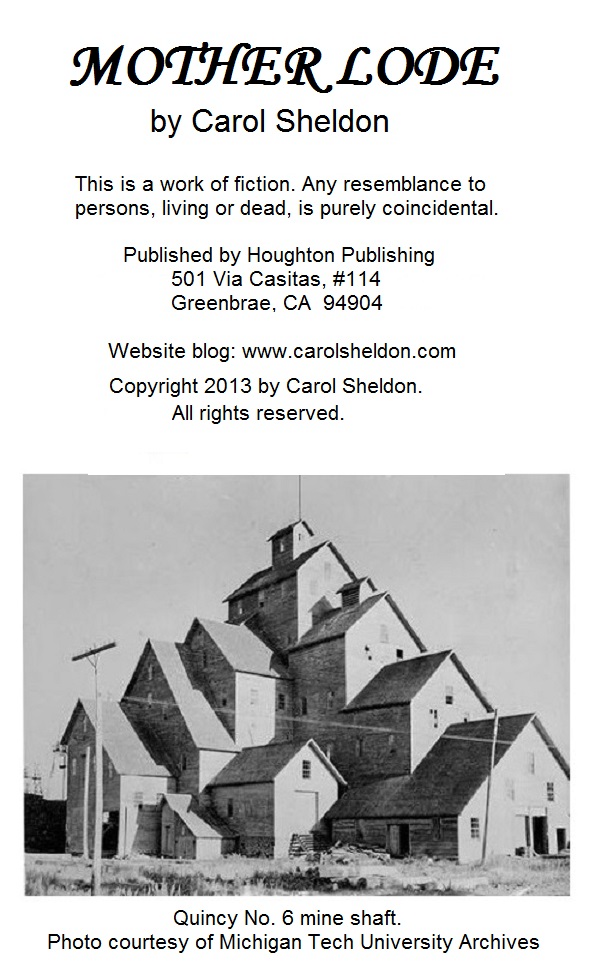Mother Lode
Authors: Carol Anita Sheldon
Tags: #romance, #mystery, #detective, #michigan, #upper peninsula, #copper country, #michigan novel, #mystery 19th century, #psychological child abuse




Chapter 1
The blizzard had obliterated the road. Jorie
rubbed the snow from his lashes for the hundredth time. With the
snow already a foot deep, and no town lights in sight, it was
almost impossible to steer a steady course with the buggy.
The sun had disappeared over the horizon of
Michigan’s Upper Peninsula, leaving the sky dark, but not yet
black. With no lantern, Jorie knew he’d be lost in a frozen
oblivion if he didn’t see some sign of civilization soon. Aiming
for a mid point between the trees on either side of the road was
the best he could do. One wrong move and the mare could slip into a
ditch and break a leg.
I need to get to the sheriff’s. I need to get
there soon, or I’ll never get there at all.
Like silent, moving pictures in a
kinetiscope, the snow made its presence without sound. Autumn
leaves, still blushing red, commingled with the falling snow.
Recent memory bubbled
up.
Take my arm, Mother, and you won’t
slip.
A gust of wind, spinning the snow
into a vortex around him brought him back from reverie. He must
keep his wits about him if he was to get out of this alive; he dare
not spend a moment on what lay behind. Not now.
But for the plaintive cry of a wolf, the
night fell into a terrible silence. The lap robe did little to warm
him as spasms of cold ricocheted through his whole body.
Where was he, how far from Hancock? Had he
passed the big turn in the road yet? The otherworldliness of the
situation left him without feeling for time or place.
Finally, downdrafts of
smoke from the towering stack of the Portage Copper Mining Company
reached his nostrils. He was nearing town! Tears of relief turned
icy before they’d run their course. Acrid odors of blasting powder
filtered downwind from the smelting plant. Soon the exhaust of
the
Keweenaw
joined that of the Portage, its fiery red glow throwing
sparks from her towering chimney.
As the sight of gas streetlamps beckoned him,
he felt the loosening of his stomach muscles; his hands relaxed
their grip on the reins. Then his stomach balled into an even
tighter knot: In only minutes, he’d have to tell his awful story to
Mr. Foster.
He traversed the silent streets of town in
solitude. So stiff with cold when he reached the sheriff’s house,
he could barely grasp the knocker.
Cora Foster peered out into the blizzard.
“Who is it?”
“J—Jorie.”
The rounded woman stood back staring at the
white apparition before her, blowing wisps of hair from her face.
At last she found her voice. “Jorie Radcliff! What are you doing
out in such a misery?”
“I need to see—”
“Come in, come in.” She stood back in
amazement. “Just look at you, like a ghost from the other side!
Lordy, I hardly know you.”
She brought him in and closed the door.
Unmindful of the snow he was bringing in, Jorie followed her dumbly
into the parlor, where Mrs. Foster seated him by the fire and
draped an afghan over his knees.
She poked at the coals, and added more wood.
“Who’d have thought, such a storm, and it not even November?” she
said, although an October storm in these parts was not unusual.
Jorie pushed his wayward thoughts aside,
focused on the sounds: the rasp of metal against metal, the fall of
cinders, and the thud of new wood placed on the grate. Cora Foster
was making up the fire. He had been in this home many times; he
would be all right now.
From the kitchen, he heard, “Who is it,
Cora?”
“It’s the Radcliff boy, Earl.”
Jorie heard the sheriff’s chair pushed back
from the kitchen table. Mr. Foster came into the parlor, a large
blue napkin tucked under his chin and extending over his broad
chest. Earl Foster was a barrel-chested man, not tall, but making
up for it in strength.
“What brings you here, lad?” The sheriff
pulled off his bib, wiped it roughly across his mouth.
Whether it was his chattering teeth or the
emotional shock, Jorie could barely speak.
“In the forest . . .” He couldn’t finish.
“What about the forest?”
It seemed the sheriff was towering over him
like Goliath. Jorie stared at the man’s trousers and noticed that a
button on Mr. Foster’s fly was missing.
“It started sn-owing.”
“Yes?”
“Let the lad catch his breath, Earl. He’s
half froze. I’ll fix something to warm him up.”
Mrs. Foster disappeared into the kitchen,
beckoning the sheriff to follow.
Briefly, scenes in the snow played around the
edges of Jorie’s mind, but he couldn’t keep them stage center. He
descended into numbness, only to be startled back to the dreadful
events of the day, as Mrs. Foster placed a tray on his lap.
When he finished the chowder and the chill
had begun to wear off, he put his spoon down and let his lids
fall.
Mrs. Foster collected the bowl, and Mr.
Foster returned to the room and sat down.
“Start at the beginning and tell me what
happened.”
When Jorie opened his eyes, it was Mr.
Foster’s eyebrows that caught and held his attention. He’d known
they were bushy, but he’d never noticed before that the left one
had several hairs almost an inch long curling up toward his
brow.
“What happened in the forest?”
Jorie forced himself to put his thoughts
where they least wanted to go. “It started out a sunny day. I took
my m-mother . . .”
“Your
mother
? Where
is
she?”
Jorie wet his lips. “I took her for a ride in
the buggy, and a walk in the woods.”
“In this storm? What the hell did you do that
for?” The sheriff was on his feet again.
“It wasn’t snowing when we started out!”
Jorie buried his head in his hands.
Earl Foster let out a long breath.
“It was sunny, and then it started. . . ”
The sheriff was pacing. If only he’d stay
put, Jorie thought he could get his thoughts corralled.
“It turned into a blizzard— very quickly. We
got lost, and she kept slipping in the snow.” His voice dropped to
a whisper. “Then she fell—”
Earl Foster leaned closer. “How’s that? I
didn’t hear you.”
“She fell— her ankle. She couldn’t walk.”
It was difficult to keep focused. He was
listening to the pendulum and the cinders fallings. Anything, to
avoid reliving the afternoon.
“She told me to find the trail and come back
for her.” He took a deep breath. “I tried to make her
comfortable.”
“Go on.”
Jorie swallowed a few times. Earl Foster was
looking very agitated.
“I, I left her then.” He wet his lips. “And
tried to find my way out. By the time I got back to the road, I was
losing the light. I was afraid I’d never find her if I went back
without a lantern.”
“Did you have one in the buggy?”
“No.”
“Why not?”
“I—I didn’t expect to be out after dark.”
“What did you do then?”
“When?”
“When you found the road, but had no lamp!”
The sheriff was losing patience.
“Oh.” A pained look came over Jorie as he was
forced to remember. “I started down the road, hoping to find a
house, and ran into a fellow in a wagon. I asked him if he’d help
me. He had a lantern, and the two of us backtracked down the
trail.”
“The trail you’d just come off of.”
“Yes, sir. But the snow had already covered
my footprints. We searched for about an hour. It was getting dark
in the forest. The man said he had to be getting home, and I’d
better follow him out of the woods.”
“So you left her there.”
His agitation was increasing. “I didn’t see
how I could help her by staying. Can you do something, Mr.
Foster?”
“We’ll get to that.” The sheriff paced again
before sitting down. “Let me get this straight. You took your
mother for a scenic walk in the forest with a blizzard on the
way?”
“It was beautiful when we started out.”
“What time was that?”
“Around noon.”
“I thought you were working at the
newspaper.”
Jorie nodded. “I set type, midnight to
eight.”
“You didn’t hear any forecast about the
storm?”
”No, sir.”
“What was the man’s name— the man with the
lantern?”
“I don’t know.”
“Where’d he live?”
“He didn’t say. We just tried to find my
m-mother.”
“Why didn’t you carry her out with you? She
can’t weigh more than a hundred pounds.”
“We were lost. I had to find the trail first.
Then I was going to—”
“Come back and get her, yes.”
Jorie nodded.
“Had it started to snow when you went for
your walk?”
“No, sir.” Why did the sheriff keep asking
the same questions?
Earl poked around on his desk for his writing
tablet, fussed with the nib of his pen. Finally he said, “October
22, 1900.” He looked up. “Is that right, Jorie?”
“I don’t know. I think so, sir.”
He wrote down the woman’s name.
“Catherine—what was her middle name? Some goddess or other.”
“Isis. She uses her maiden name now.”
“MacGaurin.”
“Yes, sir.”
Earl Foster wrote her full name on the paper.
“Catherine Isis MacGaurin Radcliff. Do you know her age?
Thirty-five, is it?”
“Thirty-six.”
“And how old are you, Jorie?”
“I just turned eighteen.”
“When was that?”
“Two weeks ago.”
“Didn’t I hear you moved out of the house
awhile back, after a rough patch with your mother?”
“Yes, for about a month.”
“When you had that scuffle with her in your
sister’s room?”
